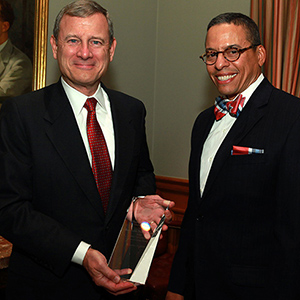|
||
|
Lorri Montgomery
Williamsburg, Va. (November 17, 2016) — Texas Judge Marc C. Carter has been named recipient of the 2016 William H. Rehnquist Award for Judicial Excellence, presented annually by the National Center for State Courts (NCSC). The Rehnquist Award recognizes a state court judge who possesses integrity, fairness, open-mindedness, intellectual courage, and sound judgment. Judge Carter, of the 228th Criminal District Court in Harris County, Texas, created the first veterans’ court in Texas, which serves as a model for veteran treatment courts across the country. He will be presented the award November 17 at the U.S. Supreme Court during a dinner hosted by Chief Justice of the United States John G. Roberts Jr. “The National Center is honored to present the Rehnquist Award to a state court judge who demonstrates the power of leading by example. Judge Carter is a veteran who is committed to helping veterans charged with criminal offenses in state courts get a second chance,” NCSC President Mary C. McQueen said. “Judge Carter recognized that for many veterans who come to court with substance abuse problems, mental health disorders, and other issues, they need rehabilitative services, not incarceration. His commitment, compassion, and leadership for veteran treatment courts serve as a national model.” In 2009 Judge Carter established one of the first veterans’ treatment courts in the country and the first such court in Texas. He has presided over this court since its creation nearly seven years ago. Texas has the second most veterans of all states and territories, behind California. Veterans’ treatment courts increase access to mental health and addiction treatment for veterans with felony and misdemeanor offenses by diverting veterans directly into Veterans Administration treatment services. The Texas program has proven to reduce jail time, costs and recidivism, while improving mental health recovery and successful re-entry for veterans into the community, said Texas Chief Justice Nathan Hecht. “Judge Carter has been a tremendous leader in Texas in the promulgation of veterans’ courts, and he has been instrumental in training judges and court leaders from across the country on the concepts he has employed in his court … his example and leadership has led to the establishment of 26 veterans’ treatment courts in Texas,” Chief Justice Hecht said in a letter of recommendation. Harris County Special Programs Manager, Mary Covington, said she is continually inspired watching Judge Carter interact with veterans who come into court: “I have seen him cry with them when they struggle and cheer them for each accomplishment. I have seen him hold them accountable and remind them of the strength and courage they possess to continue the fight. I have heard him remind them over and over that he will never give up on them. That encouragement is many times the difference between success and failure." Judge Carter earned the rank of captain in the U.S. Army, serving as a military intelligence officer from 1981 to 1988. He participated in military intelligence operations in Europe and at one point managed approximately 250 soldiers that gathered intelligence in support of tactical units in the region. His brother like their father was a career Air Defense Artillery Officer. His older brother served in the U.S. Air Force. His nephew is a West Point graduate who is currently serving overseas. “His family protected this country through three generations, and as a judge, Marc saw a chance to do something to protect the veterans themselves,” attorney Patrick F. McCann said in a letter of recommendation. After resigning his commission in 1988, Judge Carter earned his law degree from Thurgood Marshall School of Law at Texas Southern University. After graduation, he served as a law clerk for the Honorable Kenneth M. Hoyt, U.S. District Court, Southern District of Texas. From there he became an assistant district attorney and later a criminal defense attorney. In 2003 he was appointed as Judge 228th Criminal District Court. NCSC, headquartered in Williamsburg, Va., is a nonprofit court organization dedicated to improving the administration of justice by providing leadership and service to the state courts. NCSC provides executive management services to CCJ, COSCA, and several other court associations. Founded in 1971 by the Conference of Chief Justices and Chief Justice of the United States Warren E. Burger, NCSC provides education, training, technology, management, and research services to the nation’s state courts. |
- Home Page
- Newsroom
- News releases
- Texas judge recipient of William H. Rehnquist Award for work on veterans’ courts

